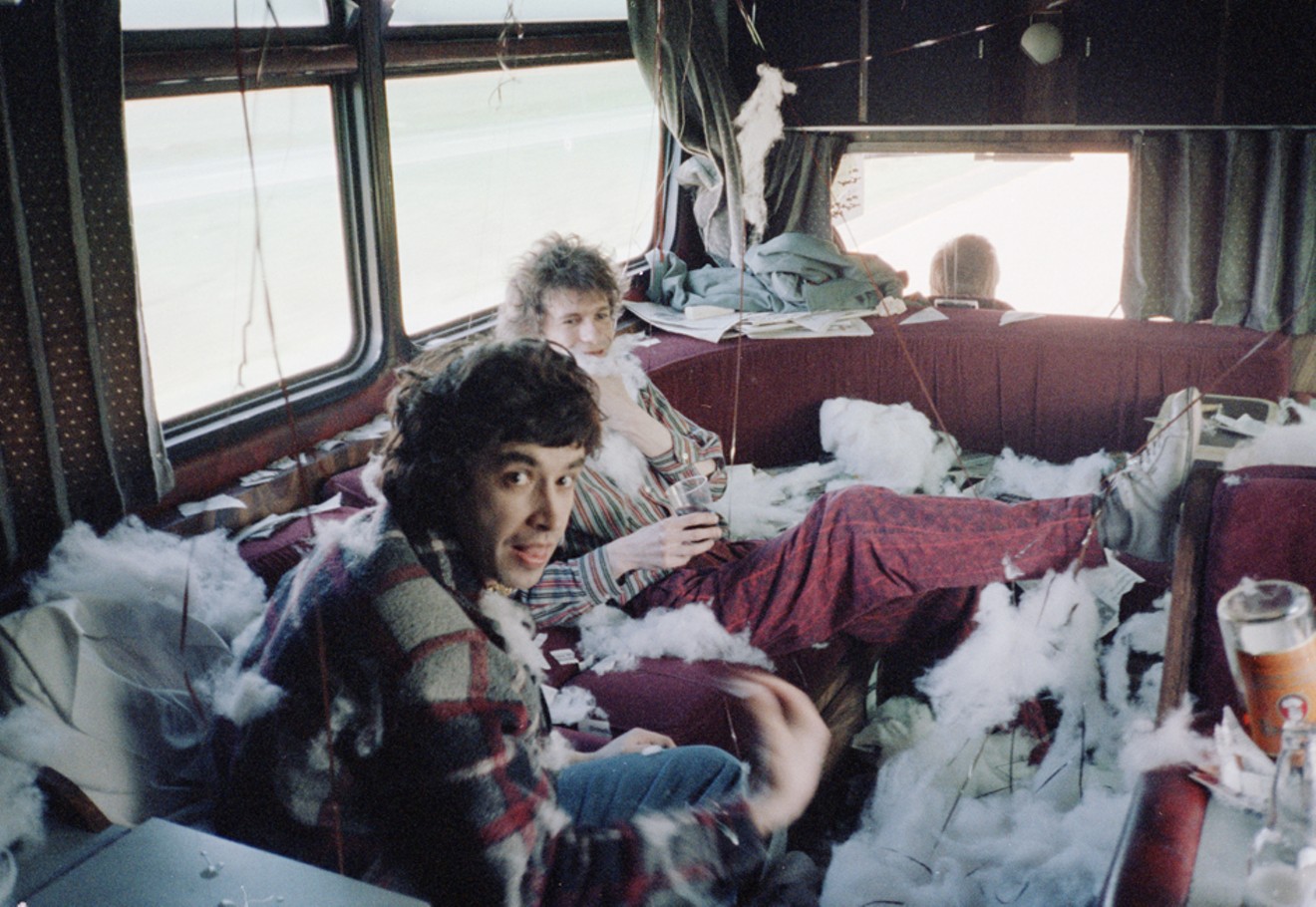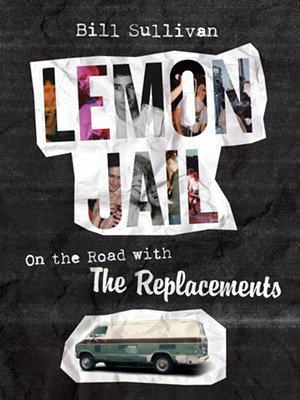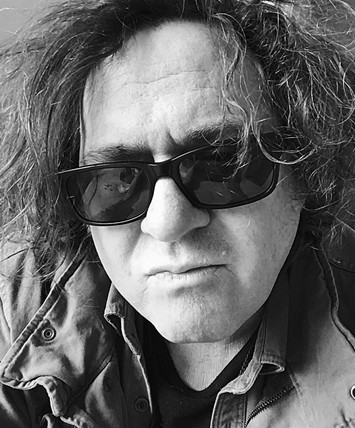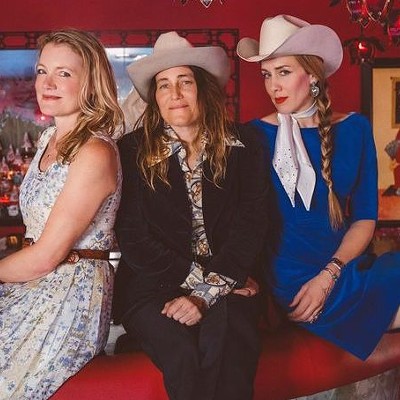The brilliant, but notoriously self-sabotaging and wildly-behaving alt-rock band were not known for their refined manners. Or trying to please anybody—including record company brass, fans, or their own employees. But from 1981-89, Bill Sullivan was up to the task—though his early experiences traveling across the country with the group did teach him a few tricks along the way that he still uses today.
“I would walk into clubs beforehand and take a look around for anything that might get destroyed—then eliminate it,” he says. “And sometimes I asked [owners] to take things out and they’d say ‘Well, what is the band going to do with that?’ And I’d say ‘If you take it away, nothing!’”
Later, when the band began marking the end of gigs by destroying their equipment—including instruments that Sullivan would then have to locate and repurchase before the next gig—he began using another trick. And that would be to physically remove items bit by bit from the stage as the show progressed. Then by the last chord on the last song, there wouldn’t be much left in arm’s reach to destroy.
Sullivan has put down to paper plenty of stories from those halcyon, touring-by-the-seat-of-your-pants days in Lemon Jail: On the Road with the Replacements (160 pp., $22.95, University of Minnesota Press). He’ll be appearing at an author session and signing books at Cactus Music on September 29 at 2:30 p.m.
The title refers to the nickname of the yellow-hued 1970’s Ford Econoline van that the Replacements used to travel across the country on tours. And in addition to its main purpose for transporting people and equipment, the Lemon Jail could also be an art canvas, trashcan, and sometimes even bathroom. It would also store suitcases, where Sullivan remembers sometimes were more filled with hair products for singer/guitarist Paul Westerberg and bassist Tommy Stinson (they of the high, scraggly coifs) than actual clothes.
“The main thing I wanted everyone to know it that it was fun. And maybe that recklessness made it fun. When Paul wanted to do something crazy, he just looked at you and boom, you were doing it!” Sullivan says today. “But did they self-sabotage? That’s the eternal question with Paul. Some shows were great, but others were really bad. And there were a lot of missed opportunities. People have told me that they would have quit my job after just one or two things that I talk about. But I just really wanted to be there for it all. I don’t know why!”
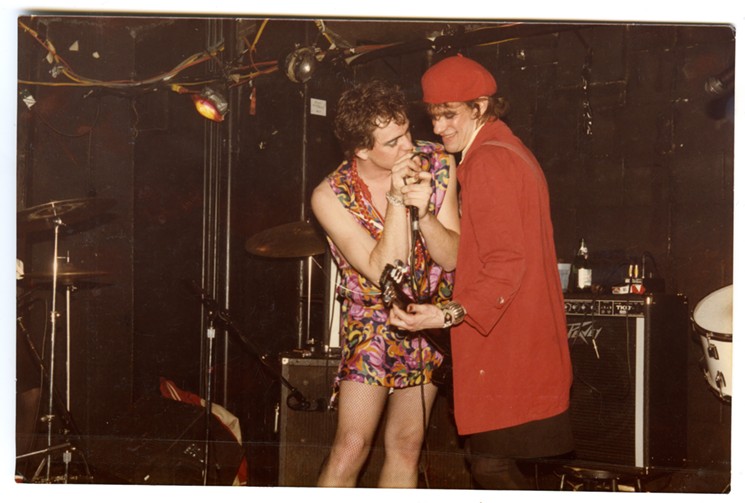
Bill Sullivan (left) gets the call up onstage to do one of his Alice Cooper, Elvis Presley, or Scarecrow covers as Paul Westerberg grins away. Not sure about those stage costumes, though...
Photo courtesy of Bill Sullivan/University of Minnesota Press
There, he found scores of photographs and negatives he’d taken while working for the band. Thinking he’d publish a mostly-picture book, he began a Kickstarter campaign. Once the University of Minnesota Press got interested, the project evolved into more of a memoir of Sullivan’s experiences growing up and touring with the Replacements. There was no shortage of stories to choose from.
Sullivan certainly doesn’t paint a glamorous picture of life on the road for a struggling post-punk/alt rock band, describing many of the venues that would book them as “leftover disco and metal clubs, foreclosed Taco Bells, and VFW Halls.” And his challenge dealing with load-in, parking, club managers and soundmen, or disappearing band members. He might even have to save a life—as when lead guitarist Bob Stinson overdosed on some heroin in an Italian hotel room in 1983.
According to Sullivan, Stinson had stopped breathing and began turning blue when he dragged him into a full-blast cold shower and began slapping him in the face before the guitarist revived. Drug problems would eventually lead to Stinson being fired from the group that included his own little brother. “There’s a lot of sad stories about him, but I tried to put some fun ones in the book,” Sullivan says. “Bob was a real trip to be around all the time.” Stinson died in 1995.
Lemon Jail describes a touring infrastructure that had little in common with the planned, managed jaunts that are the norm today, even for new bands. And audiences for early Replacements shows might consist mainly of hip record store clerks that had booked them and their friends, and curious locals not sure what they were ever going to get.
That might include the group playing country music covers to confused and angry audiences and club owners. Or a show could feature Sullivan himself taking lead vocals on tunes that turned into his specialties like Alice Cooper’s “Eighteen,” Elvis Presley’s “Do the Clam,” or the Wizard of Oz standard “If I Only Had a Brain.”
Sullivan recalls one gig in which Westerberg dove into the crowd to fight an audience member and quickly disappeared in a pile of bodies. That’s when the burly Bob Stinson picked up his road manager up “like a kitten,” deposited him in front of a live microphone, and barked out the order “Sing!”
Anecdotes about shows at two well-known Houston clubs make the book. There was an August 1, 1983 gig at Fitzgerald’s, which at the time apparently featured an aquarium behind the smaller, downstairs stage. A rowdy crowd began yelling for covers of Lynyrd Skynyrd and Hank Williams, which the band apparently fulfilled but that led to a scuffle which ended with the tank breaking and water and gasping fish spilling all over the club’s floor.
A potentially more dangerous incident happened during a show presumably at Rockefeller’s (which Sullivan remembers as a “converted bank building”). The club had a room underneath the stage that housed a 20-foot long boa constrictor in a tank. Vibrations from the band’s playing dislodged the brick that held the top of the tank in place. The snake escaped and began slithering up through the sheetrock, popping its head out near drummer Chris Mars while he was playing.
Sullivan jumped into action trying to force the serpent back through the sheetrock, while two club bouncers were downstairs on the other end of the body trying to pull it back. “I don’t like snakes better than anybody else. But I did know it was the kind of one that wouldn't bite you. And if it wrapped itself on me, there were more than enough people around to get it off,” Sullivan laughs. “I didn’t want it to get on Chris. Though he might have liked it!”
After the Replacements broke up, Sullivan continued as a tour manager for a wide range of acts including Soul Asylum, Bright Eyes, Yo La Tengo, and Conor Oberst’s Monsters of Folk. It’s a job he continues to practice to this day.
There's been a surge of interest in the Replacements music in recent years thanks to the publication of Bob Mehr's definitive bio Trouble Boys, as well as a newly-unearthed record, Live at Maxwell's 1986.
As for
He’s sent a book to Tommy Stinson’s house but heard nothing back to date. He sent Paul Westerberg an early manuscript and received a similar non-response.
But he knows that Westerberg has at least seen the finished product, having looked at a copy and flipped through it while visiting the home of latter-lineup guitarist Slim Dunlap.
“Slim’s wife told me that Paul asked if there were any pictures of him in the book, and she said there was but not to worry because they were all blurry!” Sullivan offers. “So I know Paul saw the book there, but he didn’t take it with him. And with Paul, that’s practically acceptance, since it didn’t go out the window! Maybe he doesn’t do that much at his age now. But I don’t think they’ll begrudge me about it.”
Bill Sullivan will have an author session and book signing at 2:30 p.m., Sept. 29, at Cactus Music, 2110 Portsmouth. Call 713-526-9272 or visit CactusMusicTx.com. Free.

